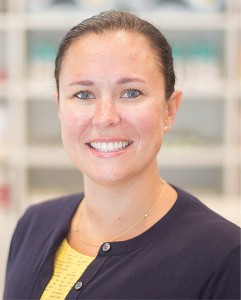By Nancy Humphrey

Pregnancy doesn’t necessarily require hospital care. That simple premise is what led Cara Osborne, MSN’01, to co-author a landmark study demonstrating the safety and effectiveness of giving birth outside a traditional medical setting.
It’s also an idea that she’s put into practice as the founder of Baby+Company, a group of five freestanding birth centers across the U.S. that offer personalized care in a setting more closely resembling an elegant spa than a busy urban hospital. With centers already operating in Arkansas, North Carolina and Colorado, the company opened facilities in Nashville this summer. Each Baby+Company center partners with a nearby academic medical facility, as the Nashville location does with Vanderbilt University Medical Center.

Osborne, who had both of her sons at birth centers, says it’s a model of care she stands behind both personally and professionally. “It’s a great option for women,” she says.
Her 2013 study in the Journal of Midwifery and Women’s Health examined the records of 15,574 women who planned on, and were eligible for, giving birth at a birth center. Eighty-four percent gave birth at a birth center, 4 percent were transferred to a hospital before admission to a birth center, and 12 percent were transferred in labor after admission. Ninety-three percent of those women had a natural birth; 1 percent experienced an assisted birth; and 6 percent delivered via cesarean section. By contrast, similar low-risk pregnancies in which mothers delivered in a hospital setting resulted in a 25 percent cesarean-section rate, according to Osborne’s analysis.
The results of the study, which replicated a 1989 paper published in The New England Journal of Medicine, were “particularly remarkable in an era characterized by increases in obstetric intervention and cesarean birth nationwide,” Osborne and her co-authors wrote.
The Baby+Company centers, each operated independently and staffed by certified nurse midwives, deliver the type of care described in the study: personalized support and clinical care from the first prenatal appointment through birth. After delivery, Baby+Company staff visit the new mother’s home to check on the mother and baby and are available for consultation as needed through the standard six-week postpartum office visit. The cost is about half that of a standard hospital birth. Out-of-pocket expenses are determined by specific health plans, although Baby+Company’s Nashville location accepts insurance and TennCare, the state’s form of Medicaid.
PREGNANCY: A NORMAL HEALTH EVENT
In Nashville, Baby+Company has signed up about 100 families so far, and Osborne estimates the center will deliver about 400 to 500 babies each year. That compares to about 4,500 babies delivered annually at VUMC.
“Research shows that birth centers don’t really feel like birth centers when you get above 500 births a year. You lose the intimacy,” says Margaret Buxton, MSN’98, clinical director of the Nashville Baby+Company and an instructor in clinical nursing at the Vanderbilt School of Nursing. “Eighty percent of pregnancies are normal health events, and the birth center offers a participatory model of care in which we get to know our patients over time.”
Occupying the site of a former Outback Steakhouse on West End Avenue about a mile from the Vanderbilt campus, Baby+Company offers several comfortable and beautifully decorated birth suites with spacious showers and tubs. The facility has classrooms for prenatal education, yoga instruction and new mom groups. A communal kitchen and living room also are available for the laboring mom’s family as they await the birth of a new family member.
“I believe—and midwives at birth centers do, too—that birth is normal physiology,” Osborne says. “We should approach it with the expectation that things will proceed normally and that the body will do its work. Then we can recognize when things are not going well and intervene accordingly, rather than approaching it from the standpoint of expecting complications, for things not to go normally, and being surprised when they do.”
Under a partnership agreement with Vanderbilt, if complications do arise—or if a woman wants an epidural—she will be transferred to VUMC. Baby+Company also will serve as a clinical training site for students at VUSN, whose nurse-midwifery program is ranked No. 3 nationally by U.S. News and World Report. In addition, students rotate through the 20-year-old West End Women’s Health Center faculty practice, where more than 20 midwives deliver more than 1,000 births a year at Vanderbilt University Hospital.
“We are delighted to be in this venture with Baby+Company,” says Dr. C. Wright Pinson, MD’80, deputy vice chancellor for health affairs, CEO of Vanderbilt Health Systems, and the H. William Scott Jr. Professor of Surgery. “Through this relationship we are able to meet the needs and preferences of certain families in an innovative fashion that fits well within the continuum of services we offer the women and children of this region.”
AN EARLY PASSION FOR NEW MODEL OF CARE
Osborne’s passion for the birth center model of care started early in her career. After graduating from Vanderbilt she worked at a birth center in Wellesley, Massachusetts, and entered the doctoral program in maternal and child health at Harvard with a focus on perinatal epidemiology. While at Harvard she was part of a research team looking at birth outcomes in hospital and birth center settings. She also worked for the Clinton Foundation in Jamaica, helping the government build a program to manage perinatal transmission of HIV.
In 2005 she joined Vincent Obstetrics at Massachusetts General Hospital, a Harvard training site. She took a break from clinical practice in 2007, joining the midwifery training program at Frontier Nursing Service in Kentucky, and ultimately accepted an academic appointment at the Eleanor Mann School of Nursing at the University of Arkansas.
“I like being a clinically practicing midwife,” Osborne says. “I have also really enjoyed taking on the academic part of it. I’m driven by the evidence base in my own clinical practice. Trying to do what I can to help show the value of midwifery in the American health system, and to demonstrate the outcomes that are possible with a low-intervention model of care, is rewarding. It’s been a step-by-step evolution, and I couldn’t have imagined when I was a brand new student midwife that all this was down the road.”
Osborne says while the business side of Baby+Company is still new for her—she’s unsure how much she wants to grow the company, for example—the important part for her is developing places that deliver exceptional clinical care while working with strong hospital and physician partners. “Our focus, for now,” she says, “is on these five centers and making sure we run them safely, effectively and efficiently.”
Nancy Humphrey is assistant director of Vanderbilt University Medical Center News and Communications.